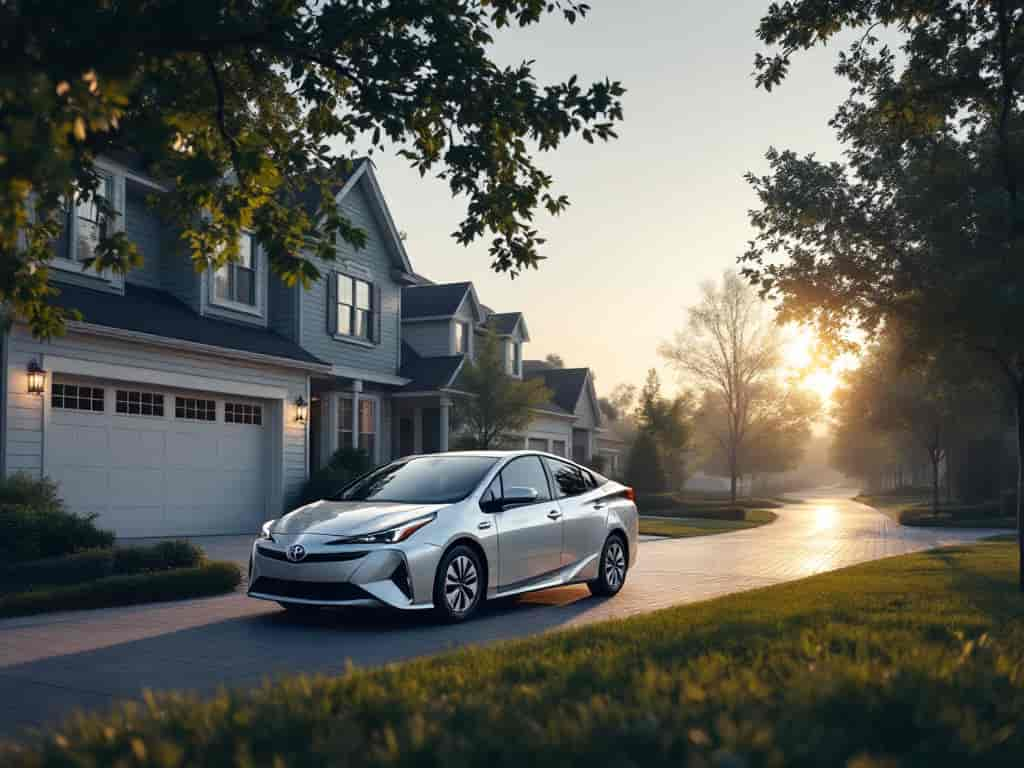Ride-Sharing’s Impact on Car Ownership Explained
Ellie Moore

Photo: Ride-Sharing’s Impact on Car Ownership Explained
Ride-Sharing’s Impact on Car Ownership Explained: Revolutionizing How We Travel
The rise of ride-sharing services like Uber, Lyft, and others has brought about a seismic shift in transportation. But beyond the convenience of booking a ride at your fingertips, how has this phenomenon impacted traditional car ownership? Is the dream of owning a car fading, or is it simply evolving? Let’s dive deep into how ride-sharing is transforming transportation and redefining what it means to own a car in today’s world.
The Evolution of Transportation and Car Ownership
For decades, owning a car was synonymous with independence and status. However, with the advent of ride-sharing platforms in the late 2000s, the transportation landscape began to change. These services offer an alternative to car ownership, particularly for urban dwellers who face high parking costs, insurance fees, and maintenance expenses.
Key Statistics Reflecting the Shift
- A 2023 study by McKinsey reported a 15% decline in first-time car buyers in urban areas, attributing the drop to the widespread availability of ride-sharing services.
- Statista found that 36% of millennials in the U.S. are likely to rely solely on ride-sharing services rather than owning a car.
Why People Are Choosing Ride-Sharing Over Car Ownership
1. Cost Efficiency
Owning a car involves recurring expenses like fuel, maintenance, insurance, and registration fees. According to the American Automobile Association (AAA), the average annual cost of owning a car in the U.S. is $10,728. In contrast, ride-sharing eliminates these fixed costs, offering a pay-as-you-go model that is particularly attractive to budget-conscious individuals.
2. Convenience and Accessibility
Ride-sharing apps are designed for user convenience. With just a few taps, you can book a ride to your destination without worrying about parking, traffic, or navigation. This ease of use appeals to people in cities with robust ride-sharing networks, where owning a car may feel more like a burden than a necessity.
3. Environmental Awareness
Environmental concerns have also played a significant role in reducing car ownership. Ride-sharing services, especially those that promote carpooling options, contribute to lower carbon emissions by reducing the number of vehicles on the road. Additionally, companies like Lyft and Uber are introducing electric and hybrid vehicles into their fleets, further appealing to eco-conscious consumers.
4. Urbanization Trends
The urban lifestyle often makes car ownership less practical. Parking spaces are scarce, and public transportation is often more efficient for commuting. Ride-sharing complements this ecosystem by filling the gaps in public transit coverage, ensuring seamless mobility.
Challenges and Downsides of Relying Solely on Ride-Sharing
While ride-sharing offers undeniable benefits, it’s not without drawbacks.
- Surge Pricing: During peak hours or bad weather, ride-sharing costs can skyrocket, making it less affordable.
- Limited Availability: In rural areas or smaller towns, ride-sharing services may not be as accessible.
- Privacy and Safety Concerns: Sharing rides with strangers can deter some users, particularly during late-night trips.
Who Benefits the Most from Ride-Sharing?
Urban Millennials and Gen Z
Tech-savvy and cost-conscious, these younger generations prioritize convenience and flexibility. They often view cars as an unnecessary expense, especially when ride-sharing provides a viable alternative.
Seniors and Retirees
Ride-sharing services are a lifeline for seniors who may no longer be able to drive but still want to maintain their mobility.
Frequent Travelers
For individuals who frequently travel for work or leisure, ride-sharing eliminates the need for airport parking or expensive rental cars.
How Ride-Sharing is Reshaping the Automotive Industry
The decline in car ownership doesn’t spell doom for automakers instead, it’s prompting innovation.
Emerging Trends
- Subscription Models: Companies like Volvo and BMW now offer car subscription services, blending the benefits of ownership with the flexibility of ride-sharing.
- Electric and Autonomous Vehicles: Ride-sharing companies are heavily investing in autonomous and electric vehicle technologies, which could revolutionize the industry further.
Car Ownership in Suburban and Rural Areas
While urban residents are embracing ride-sharing, car ownership remains essential in suburban and rural areas where public transportation and ride-sharing options are limited. This dichotomy suggests a coexistence of ownership and sharing models tailored to geographic needs.
Practical Tips for Consumers
If you’re contemplating whether to own a car or rely on ride-sharing, consider these factors:
- Analyze Your Travel Habits: How often do you drive? If your trips are infrequent, ride-sharing may be more cost-effective.
- Calculate the Costs: Use a car ownership calculator to compare the total cost of owning a car versus ride-sharing expenses.
- Combine Options: Many people find a hybrid approach owning a car for long trips and using ride-sharing for daily commutes to be the most practical.
The Future of Car Ownership
As ride-sharing becomes more integrated into urban lifestyles, traditional car ownership is likely to evolve rather than disappear. Shared mobility, subscription services, and autonomous vehicles will all play a role in shaping the future of transportation.
Frequently Asked Questions (FAQ)
Q: Are ride-sharing services cheaper than owning a car in the long term?
A: It depends on your location and usage. For urban residents with minimal travel needs, ride-sharing can be more economical.
Q: How does ride-sharing impact the environment?
A: Ride-sharing reduces the number of cars on the road, particularly through carpooling, which lowers greenhouse gas emissions.
Q: Will car ownership become obsolete?
A: Unlikely. While ride-sharing is reducing car ownership in urban areas, cars remain essential in regions with limited transportation options.
Call-to-Action
Ride-sharing is undoubtedly revolutionizing transportation, but is it the right choice for you? Share your thoughts in the comments below! Don’t forget to explore related articles on sustainable mobility and emerging transportation trends to stay informed about the future of travel.
Finance & Investment
View All
August 18, 2025
Finance Made Simple for EveryoneGo beyond keywords! Learn to craft expert SEO content that ranks high, demonstrates E-E-A-T, and deeply understands user intent for real value.
Ellie Moore

August 14, 2025
Mazda Financing Deals You’ll LoveUnlocking Top Rankings: Your Guide to Expert SEO Content In today's crowded digital landscape, simply having content isn't enough. To truly stand out, attract y...
Ellie Moore

November 11, 2025
Construction Financing Rates 2025Unlocking Visibility: The Power of Expert SEO Content In today's crowded digital landscape, simply having content isn't enough. To truly stand out, attract your...
Ellie Moore

May 14, 2025
Comm Finance Explained SimplyUnlock top SEO rankings & authority with expert content. Go beyond keywords to deliver true value, build trust, and dominate your niche.
Ellie Moore

June 21, 2025
Subaru Financing Deals for Smart DriversElevate your online presence with expert SEO content. Drive organic traffic, boost rankings, and build brand authority through quality and value.
Ellie Moore

November 28, 2025
Small Business Financing Options 2025Boost rankings & traffic with expert SEO content. Build authority, trust, and align with Google's E-E-A-T. Deliver unparalleled value beyond keywords.
Ellie Moore
Insurance
View AllProtect your paycheck with disability insurance. Learn why income protection is a must-have for financial security.
Ellie Moore
Learn how self-insured companies manage risks, reduce costs, and create customized insurance solutions for employees.
Ellie Moore
Overpaying for car insurance? Discover top-rated solutions for optimal coverage & value. Protect your finances with our comprehensive guide.
Ellie Moore
Explore Nationwide Pet Insurance: plans, costs, coverage, claims, waiting periods, and market trends. Your ultimate guide to protecting your beloved pet.
Ellie Moore
Secure optimal car insurance! Our guide helps policyholders & risk managers find top providers, maximize value, protect assets, and avoid overpaying.
Ellie Moore
Navigate your Allstate car insurance quote with ease. Discover optimal coverage, understand rates, and maximize savings for peace of mind.
Ellie Moore
Education
View AllUnderstand dyslexia and discover effective ways to support dyslexic students in the classroom. Learn proven strategies to improve learning outcomes.
Read MoreSocial skills training is key for kids with autism. Learn practical strategies to improve social interaction and communication in children with ASD.
Read MoreIs a college degree still worth it? Dive into a detailed analysis of the ROI on higher education, including costs, benefits, and future prospects.
Read MoreSudbury schools embrace radical self-direction in learning. Learn how they empower students to take full control of their education journey.
Read MoreShould smartphones be allowed in classrooms? Explore the pros and cons of using smartphones in education and their impact on learning.
Read MoreTeacher burnout is on the rise. Learn about its causes, consequences, and practical solutions to support educators and improve well-being.
Read MorePopular Post 🔥
View All
1
2
3
4
5
6
7
8
9
10
Health






Automotive
View All
February 1, 2025
Hybrid vs. Electric Cars: Which Should You Buy?
Comparing hybrid and electric cars? See which is better for your needs. Find out which vehicle offers the best value, efficiency, and performance.

September 1, 2025
Understanding An Automotive AC Diagram
Unlock your car's AC secrets! Learn to read automotive AC diagrams, diagnose issues, and troubleshoot problems. Stay cool and confident on the road.

August 20, 2025
Bills Automotive Affordable Local Car Care
Bills Automotive offers affordable, reliable local car care. Break the myth that quality service is expensive & save on auto maintenance.

July 16, 2025
Where To Find Automotive Technician Jobs Now
Passionate about cars? Discover the booming demand for automotive technician jobs. Explore diverse roles and a promising future in auto tech!

July 22, 2025
All Things Automotive To Keep Your Car Running
Maximize your car's life & save money! Learn essential maintenance tips for optimal performance, safety, and longevity. Keep your vehicle running smoothly.

August 24, 2025
Hayes Automotive Top Repairs And Diagnostics
Demystify car troubles! Discover expert diagnostics & repairs for common vehicle issues, ensuring peace of mind & superior automotive care.

















